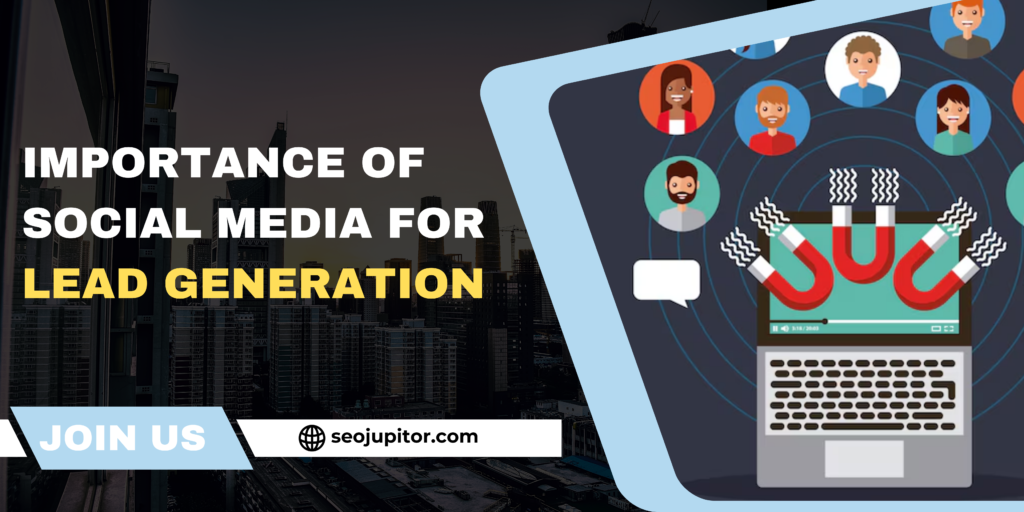In an age where almost half of the world’s population is active on social media, platforms like Facebook, Instagram, LinkedIn, and Twitter have emerged as critical tools for businesses seeking to generate leads. Social media isn’t just a channel for brand visibility or customer engagement; it’s become a powerful space for discovering new prospects, nurturing customer relationships, and driving conversions. For modern businesses, understanding the role of social media in lead generation can be the key to unlocking growth and staying competitive.
Why Social Media is Essential for Lead Generation
Social media allows businesses to reach audiences directly, create personalized interactions, and gather invaluable insights into customer behavior. Unlike traditional marketing, which can be costly and limited in reach, social media allows businesses of all sizes to engage with their target audience in meaningful ways. Here are several reasons why social media is essential for lead generation:
1. Unparalleled Reach and Audience Targeting
The sheer volume of users on social media platforms is staggering. Facebook alone boasts over 2.9 billion monthly active users, while LinkedIn has over 850 million users focused primarily on professional networking. Such extensive reach provides businesses with a significant pool of potential leads. Beyond this reach, social media platforms allow for highly specific audience targeting based on demographics, interests, and behavior.
For instance, Facebook and Instagram enable advertisers to segment their audience by age, gender, location, and more. LinkedIn provides the unique option of targeting users by job title, company, or industry, which is particularly beneficial for B2B companies. This precise targeting capability allows businesses to attract high-quality leads more likely to convert into loyal customers.
2. Building Brand Trust and Credibility
Trust is one of the most valuable assets for businesses in a digital-first world. People are more likely to buy from brands they trust, and social media offers an ideal platform to establish this trust. By consistently sharing high-quality content, engaging with followers, and showcasing expertise, businesses can strengthen their credibility.
For example, companies that post customer testimonials, share their achievements, and actively engage with their audience are viewed as trustworthy and credible. Social media provides transparency, allowing businesses to showcase their human side and build genuine connections with their followers. This trust-building process is crucial because users who trust a brand are more likely to become leads and, ultimately, loyal customers.
3. Engagement Through Interactive and Engaging Content
Social media provides various content formats that encourage interaction. Unlike traditional advertising, which often relies on one-way communication, social media enables two-way interactions that make lead generation more dynamic and engaging. Businesses can use videos, polls, Q&A sessions, live streams, and stories to interact with their audience in real-time.
Live streaming, for example, has become an effective tool for lead generation. Companies can host live product demos, Q&A sessions, or behind-the-scenes tours that showcase their offerings. This interactive approach engages viewers and prompts them to ask questions, seek more information, and make inquiries – all of which are valuable steps in the lead-generation process.
4. Cost-Effective Advertising Options
Social media advertising is a highly cost-effective way to reach a targeted audience. Compared to traditional advertising channels, which require significant budgets, social media ads can be customized to suit any budget and are easily scalable. Businesses can start with a modest budget and gradually increase it as they see results, allowing for flexibility in spending.
Moreover, social media platforms offer tools to monitor the success of ads in real-time, making it easy to adjust campaigns for better performance. Small businesses, in particular, benefit from social media advertising, as it offers an affordable entry into lead generation and helps level the playing field with larger companies.
5. Real-Time Feedback and Analytics
One of the greatest advantages of social media for lead generation is the availability of real-time feedback and analytics. Social media platforms provide in-depth insights into user interactions, including likes, shares, comments, and click-through rates. Businesses can track how many people viewed, engaged with, or clicked on an ad, helping them understand which strategies are most effective.
Analytics also allow companies to make agile adjustments to their campaigns based on performance metrics. For instance, if a particular ad isn’t generating the expected leads, businesses can immediately tweak the messaging, adjust the targeting, or reallocate budget to more successful efforts. This data-driven approach ensures that social media lead generation is optimized for maximum impact.
6. Personalized Customer Journeys
Social media is more than a one-size-fits-all platform; it allows businesses to create personalized experiences for users. By leveraging data on user preferences, interests, and online behaviors, companies can deliver tailored content that resonates with individual customers at different stages of their journey.
For example, a business can segment its audience into various groups, such as new followers, frequent engagers, or loyal customers. Each group can then receive content that speaks directly to their needs and interests. For new followers, businesses might share introductory posts, while loyal customers may receive exclusive offers or discounts. By tailoring interactions, businesses can nurture leads effectively, ultimately driving them toward conversion.
7. Driving Traffic to Your Website
Social media is an excellent channel for driving traffic to your website, where potential leads can learn more about your products or services. By including links to landing pages, blog posts, or product pages in social media posts, businesses can guide users directly to their website, where they can explore in greater detail.
Moreover, calls-to-action (CTAs) such as “Learn More,” “Shop Now,” or “Get a Quote” are instrumental in encouraging users to take action. When users click on these links, they are directed to pages designed to capture their information, transforming social media engagement into tangible leads.
8. Social Proof and User-Generated Content
Social proof is a powerful tool for influencing potential customers, and social media amplifies this impact. User-generated content (UGC) – such as reviews, testimonials, and photos shared by customers – serves as a form of endorsement for your brand. UGC builds trust, showing potential leads that real people have had positive experiences with your products or services.
Encouraging customers to tag your business in posts or share their experiences provides authenticity and serves as a form of social validation. Prospective leads are more likely to trust the opinions of their peers than branded content alone, making UGC a valuable component of social media lead generation.
9. Establishing Authority with Content Marketing
Educational content, such as blog posts, e-books, whitepapers, and infographics, helps establish your brand as an authority in your industry. Sharing valuable insights on social media provides a service to your audience while positioning your business as a knowledgeable resource.
For example, a software company might share tips on productivity or security, indirectly showcasing its expertise in the field. When users see consistent, helpful content from your brand, they are more likely to engage and view your business as a reliable source, making them more receptive to your offerings.
10. Utilizing Retargeting to Capture Leads
Social media retargeting is a powerful way to re-engage users who have shown interest in your products or services but have yet to convert. By retargeting ads, businesses can remind potential leads about their offerings, encouraging them to return and complete their journey.
For instance, a user who visits a product page but doesn’t make a purchase can later see ads for that product on their social media feeds. Retargeting reinforces brand recall and helps nurture leads who may have been hesitant to convert initially.
Conclusion: Social Media as a Lead Generation Powerhouse
Social media has reshaped the way businesses generate leads, offering a mix of targeted advertising, real-time feedback, guest posting opportunities, and personalized engagement that traditional channels cannot match. By building trust, creating engaging content, and leveraging data insights, social media allows businesses to attract, nurture, and convert leads effectively. In today’s digital landscape, a strong social media presence isn’t just beneficial; it’s essential for sustainable growth and success.
Businesses that invest in social media lead generation are likely to see increased brand awareness, stronger customer relationships, and a steady stream of high-quality leads. For any business looking to stay competitive and connected with its audience, social media should be a cornerstone of its lead-generation strategy, with guest posting adding extra value for reaching broader audiences and driving more engagement.



Pingback: 7 Proven Tips to Boost Your LinkedIn Presence and Branding